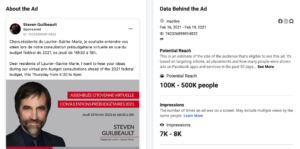
Canadian Heritage Minister Steven Guilbeault yesterday told the House of Commons Heritage Committee that his department would reduce the amount it allocates to digital advertising, arguing that too much goes to online platforms and that “we need to change this.” The decision to politicize where the government spends its ad dollars is perhaps unsurprising given Guilbeault’s penchant for battling with the tech companies, dating back to his claims that linking to news articles without payment is “immoral.” Leaving aside the question of whether taxpayer funded advertising campaigns should prioritize effectiveness and value for money (personally, I’d prefer that the government emphasize the effectiveness of ad campaigns on issues like COVID-19 vaccination and safe social distancing practices over political posturing even if that means advertising on digital platforms), the reality of Guilbeault’s own Facebook practices do not match up with his rhetoric.
For example, during the last election campaign, Guilbeault personally ran 54 ads on Facebook, allocating over $10,000 toward the digital ad campaign. In fact, just last month, Guilbeault advertised on Facebook promoting pre-budget consultations in his constituency. Nothing wrong with making constituents aware of a policy process, but a curious decision given his comments on Facebook advertising.
Guilbeault is hardly alone in this regard with the majority of the Heritage committee also personally advertising on Facebook. Liberal MPs Marci Ien, Tim Louis, Lyne Bessette, and Julie Dabrusin have all spent thousands of dollars on Facebook ads. Other committee members such as Heather McPherson, Alain Rayes, Anthony Housefather, Scott Aitchison, and Martin Shields have also advertised on Facebook. Given their use of Facebook for advertising purposes, the opposition to similar government advertising is hard to square.
More difficult is Guilbeault’s regular posting of news articles and videos on Facebook, where over the past year he has shared more than a dozen articles and posted at least ten videos that use third party broadcaster content. The shared articles come from a wide range of news sources including the Journal de Montreal, La Presse, Global News, and the Toronto Star. Given that there was no payment for these links, one wonders if Guilbeault thinks these are also immoral.
The video use raises more questions. Rather than post links, Guilbeault has at times made a copy of the video and posted it directly to Facebook. For example, this post features his full appearance on Tout le Monde en Parle. The segment is available online and could be linked, but Guilbeault instead made a copy of the 14 minute appearance and uploaded it himself, thereby denying the referral to the original broadcaster. Did he obtain permission or a licence? Does he think that posting a full 14 minute video is fair dealing? In fact, he’s done the same thing many times, including to videos he has copied and uploaded where he is criticizing the Internet platforms for their practices. Perhaps a closer examination of his own social media practices are in order.
The post Do As I Say, Not As I Do: Heritage Minister Steven Guilbeault’s Curious Use of Facebook appeared first on Michael Geist.
Comments
Post a Comment